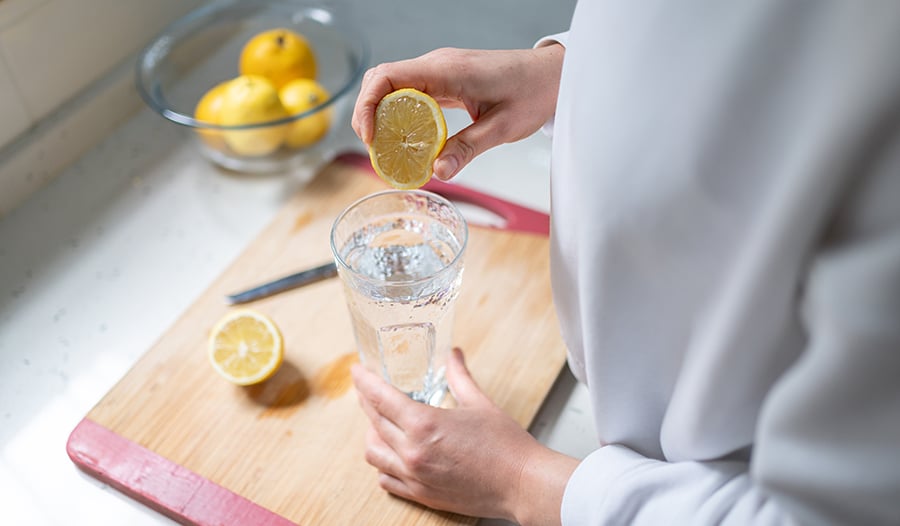How To Detox: Effective Strategies and Supplements for Liver Health

‘Tis the season for celebration and gathering with family and friends. Offices are full of holiday goodies too. Unfortunately, this can lead to overindulgence. Festive meals, sugary treats, and plenty of alcoholic beverages can throw off your eating habits, leading to feelings of lethargy, bloating, and digestive discomfort.
Thankfully, there are natural ways to rejuvenate your body, support its detoxification process, and help your liver recover from holiday indulgences. Read on to learn effective strategies and supplements that can aid in post-holiday recovery.
Why Is Liver Detoxification Important?
Your liver is a complex organ crucial to your overall health. It is responsible for various functions, including filtering toxins and waste substances from the blood and creating bile to aid in digestion and metabolizing medications. When you consume excessive amounts of rich foods, alcohol, or sugary foods, your liver is overworked to process these substances. This can lead to feeling tired, bloated, and upset stomach.
Fortunately, the liver is equipped with natural detoxification mechanisms, but long-term exposure to harmful substances can overwhelm these processes. Over time, this can contribute to various health problems, including liver damage, fatty liver disease, and even liver failure. Therefore, it is necessary to support your liver's health and help it function optimally.
Habits To Support A Natural Detox
One of the most important things you can do to support your liver's health is to adopt a healthy lifestyle. This includes:
- Stay Hydrated: Drink adequate amounts of water throughout the day to help eliminate toxins and support your kidneys.
- Eat Nourishing Foods: Focus on whole, unprocessed foods like fruits, lean proteins, veggies, and whole grains. These foods provide crucial nutrients and fiber to support your liver's functions.
- Limit Processed Foods: Decrease your consumption of processed foods, which are abundant in harmful fats, carbohydrates, and additives.
- Reduce Alcohol and Sugar Consumption: While it's fine to indulge on occasion, aim to minimize or stop your use of alcohol and sugary drinks during your detox.
- Regular Exercise: Be sure to engage in regular physical activity to boost your metabolism, improve circulation, and promote detoxification.
- Adequate Sleep: Quality sleep allows your body to repair and rejuvenate.
- Manage Stress: Chronic stress can impact your liver's health. Find natural ways to manage stress, such as meditation, yoga, or spending time in nature.
By making these changes, you can help your liver function optimally and reduce the burden on your body.
Supplements For Liver Support
In addition to lifestyle modifications, some liver detox supplements can provide additional support for your detoxification process. These supplements can help protect your liver cells from damage, promote regeneration, and support your body's natural detoxification mechanisms and be a part of post-holiday detox supplements
1. Milk Thistle
Milk thistle is a famous herbal supplement that has been used for centuries to support liver health. The active ingredient is silymarin, a flavonoid complex that has been known to protect liver cells from damage and promote regeneration. Studies have revealed that milk thistle may be effective in the treatment of diseases such as nonalcoholic fatty liver disease (NAFLD) and hepatitis.
2. Turmeric
Turmeric, a vibrant yellow spice often used in Indian cuisine, contains curcumin, a powerful antioxidant and anti-inflammatory compound. Curcumin has beneficial effects on liver health by reducing inflammation, improving liver function, and protecting against liver damage caused by toxins. A study found that curcumin supplementation may help to reduce liver inflammation and improve antioxidant status in people with nonalcoholic steatohepatitis (NASH), a more severe form of NAFLD.
3. Dandelion Root
Dandelion root is a natural diuretic traditionally used to support liver health and digestion. While more research is needed, some studies suggest that dandelion root may help remove toxins from the body and support liver function. A small study found that dandelion root extract can improve liver function and lower oxidative stress.
4. N-Acetylcysteine (NAC)
N-acetylcysteine (NAC) is an amino acid precursor for glutathione, a powerful antioxidant that plays an essential role in protecting the liver from damage. A study found that NAC supplementation may improve liver function and decrease oxidative stress in patients with chronic hepatitis B. NAC has been effective in treating conditions such as acetaminophen overdose and liver cirrhosis.
5. B Vitamins
B vitamins are critical for various metabolic processes, including liver detoxification. Studies have shown that B vitamins, especially B6, B12, and folic acid, play a role in liver health. For example, a study found that folic acid supplementation can improve liver function and alleviate inflammation in patients with chronic hepatitis C.
6. Omega-3 Fatty Acids
Omega-3 fatty acids (omega-3s) present in fatty fish, flaxseeds, and chia seeds are essential for overall health and can also have beneficial effects on liver function. Studies indicate that omega-3s can lower inflammation, improve liver function, and defend against liver disease. A meta-analysis found that omega-3 fatty acid supplementation can lessen the risk of developing nonalcoholic fatty liver disease.
7. Betaine
Betaine, also known as TMG, is a compound found naturally in beets and other foods. It has been demonstrated to have hepatoprotective characteristics, which means it can help protect the liver against damage. Betaine can also help reduce liver inflammation and improve liver function. A study found that betaine supplementation could improve liver enzymes and reduce inflammation in patients with nonalcoholic fatty liver disease.
8. Alpha-Lipoic Acid
Alpha-lipoic acid is a powerful antioxidant that can defend the liver from damage caused by oxidative stress. It can also help enhance liver function and reduce inflammation. A study found that alpha-lipoic acid supplementation can improve liver function and lower oxidative stress in patients with chronic hepatitis C.
9. Licorice Root
Licorice root is a traditional herbal treatment that has been used for ages to improve liver function and digestion. While more research is needed, some studies suggest that licorice root may have liver-protective properties that help enhance liver function. However, it's important to note that consuming too much licorice root can lead to side effects, so it's best to consult a healthcare professional before using it as a supplement.
Incorporating Detoxifying Practices
While supplements and dietary changes can significantly support your liver's detoxification process, several lifestyle practices can help serve as effective detox strategies.
Saunas And Steam Rooms
Saunas and steam rooms increase body temperature and cause profuse sweating. This sweat can help eliminate toxins through the skin and effectively detoxify the body. In addition to detoxification, saunas and steam rooms can also improve circulation, reduce stress, and promote relaxation.
Dry Brushing
Dry brushing is the process of gently exfoliating your skin using a natural bristle brush. It can enhance blood circulation, lymphatic drainage, and the removal of dead skin cells, all of which aid in toxin elimination. Dry brushing can also improve skin texture, reduce cellulite, and boost your immune system.
Deep Breathing Exercises
Deep breathing exercises, like diaphragmatic breathing or pranayama, help oxygenate your blood and reduce stress. It can improve your overall well-being and support your body's natural detoxification processes. Deep breathing can also lower blood pressure, improve digestion, and increase mental clarity.
Intermittent Fasting
Intermittent fasting involves cycling between eating and fasting periods. This can help your digestive system relax and focus on repair and rejuvenation. Intermittent fasting has been demonstrated to boost metabolic health, lower inflammation, and aid in weight reduction.
Hydrotherapy
Alternating between hot and cold showers or baths can stimulate circulation, improve blood flow, and promote the elimination of toxins. The heat of a hot shower can relax muscles, increase blood flow, open pores, and help flush out toxins. Cold water stimulates blood circulation, increases metabolism, and strengthens the immune system. Alternating between the two can be beneficial for detoxification and overall health.
Epsom Salt Baths
Epsom salt, a magnesium sulfate compound, can have many health benefits when added to bath water. Epsom salt baths can help relax muscles, lower inflammation, and promote detoxification. Some people believe that Epsom salt baths can help remove toxins from the body through the skin.
Yoga and Meditation
Yoga and meditation are ancient activities with significant physical and mental health benefits. They can help relieve stress, induce relaxation, and support the body's natural detoxifying mechanisms.
The Bottom Line
By combining healthy lifestyle choices, targeted supplementation, and supportive practices, you can effectively support your liver's detoxification functions and promote overall well-being. Remember, sustainable health is achieved through small, steady steps rather than quick fixes.
References:
- Abdelmalek, Manal F., et al. “Betaine for Nonalcoholic Fatty Liver Disease: Results of a Randomized Placebo-Controlled Trial.” Hepatology, vol. 50, no. 6, 17 Aug. 2009, pp. 1818–1826, onlinelibrary.wiley.com/doi/full/10.1002/hep.23239, https://doi.org/10.1002/hep.23239. Accessed 13 Sept. 2019.
- de Avelar, Camila Ribeiro, et al. “Effect of Silymarin on Biochemical Indicators in Patients with Liver Disease: Systematic Review with Meta-Analysis.” World Journal of Gastroenterology, vol. 23, no. 27, 2017, p. 5004, https://doi.org/10.3748/wjg.v23.i27.5004.
- Grant, D. M. “Detoxification Pathways in the Liver.” Journal of Inherited Metabolic Disease, vol. 14, no. 4, July 1991, pp. 421–430, https://doi.org/10.1007/bf01797915.
- Gumral, Nurhan, et al. “Protective Effect of Alpha Lipoic Acid against Liver Damage Induced by Cigarette Smoke: An in Vivo Study.” Saudi Journal of Medicine and Medical Sciences, vol. 9, no. 2, 2021, p. 145, https://doi.org/10.4103/sjmms.sjmms38720.
- Hamza, Alaaeldin Ahmed, et al. “Dandelion Prevents Liver Fibrosis, Inflammatory Response, and Oxidative Stress in Rats.” The Journal of Basic and Applied Zoology, vol. 81, no. 1, 1 July 2020, https://doi.org/10.1186/s41936-020-00177-9.
- Horak, Katarina. “Body Detox.” Google Books, 2024. Accessed 31 Aug. 2024.
- Jazayeri-Tehrani, Seyed Ali, et al. “Nano-Curcumin Improves Glucose Indices, Lipids, Inflammation, and Nesfatin in Overweight and Obese Patients with Non-Alcoholic Fatty Liver Disease (NAFLD): A Double-Blind Randomized Placebo-Controlled Clinical Trial.” Nutrition & Metabolism, vol. 16, no. 1, 28 Jan. 2019, https://doi.org/10.1186/s12986-019-0331-1.
- Klein, A. V., and H. Kiat. “Detox Diets for Toxin Elimination and Weight Management: A Critical Review of the Evidence.” Journal of Human Nutrition and Dietetics, vol. 28, no. 6, 18 Dec. 2014, pp. 675–686, https://doi.org/10.1111/jhn.12286.
- Lin, Chun-che, et al. “Vitamins B Status and Antioxidative Defense in Patients with Chronic Hepatitis B or Hepatitis c Virus Infection.” European Journal of Nutrition, vol. 50, no. 7, 24 Dec. 2010, pp. 499–506, https://doi.org/10.1007/s00394-010-0156-1. Accessed 26 July 2022.
- Panda, Chinmayee, et al. “Guided Metabolic Detoxification Program Supports Phase II Detoxification Enzymes and Antioxidant Balance in Healthy Participants.” Nutrients, vol. 15, no. 9, 6 May 2023, pp. 2209–2209, https://doi.org/10.3390/nu15092209.
- Puckett, Susan. “Intermittent Fasting and Your Health: What You Need to Know.” Boulder Medical Center, 20 Jan. 2020.
- Radcliffe, Shawn. “Does Yoga Really “Detox” Your Body?” Yoga Journal, 18 Jan. 2022, www.yogajournal.com/practice/does-yoga-detox-your-body/.
- Shohrati, Majid, et al. “Evaluation of the Effects of Oral N-Acetylcysteine and a Placebo in Paraclinical and Oxidative Stress Parameters of Patients with Chronic Hepatitis B.” Hepatitis Monthly, vol. 10, no. 2, 2010, pp. 95–100, www.ncbi.nlm.nih.gov/pmc/articles/PMC3270363/. Accessed 31 Aug. 2024.
- “The Truth about Dry Brushing and What It Does for You.” Cleveland Clinic, health.clevelandclinic.org/the-truth-about-dry-brushing-and-what-it-does-for-you.
- “Understanding Detoxification: A Guide by the American Hospital Association.” American Hospital Association’s Physician Leadership Forum, www.ahaphysicianforum.org/health/understanding-detoxification-a-guide/.
- “What Are the Benefits of an Epsom Salt Detox?” Healthline, 3 June 2021, www.healthline.com/health/epsom-salt-detox.
- Wu, Shou-Yan, et al. “Research Progress on the Protective Effects of Licorice-Derived 18β-Glycyrrhetinic Acid against Liver Injury.” Acta Pharmacologica Sinica, vol. 42, no. 1, 1 Jan. 2021, pp. 18–26, europepmc.org/article/pmc/pmc7921636, https://doi.org/10.1038/s41401-020-0383-9. Accessed 29 Jan. 2023.
- Yan, Jian-Hui, et al. “Omega-3 Polyunsaturated Fatty Acid Supplementation and Non-Alcoholic Fatty Liver Disease.” Medicine, vol. 97, no. 37, Sept. 2018, p. e12271, https://doi.org/10.1097/md.0000000000012271.
DISCLAIMER:This Wellness Hub does not intend to provide diagnosis...
















































































 Table of Contents
Table of Contents















